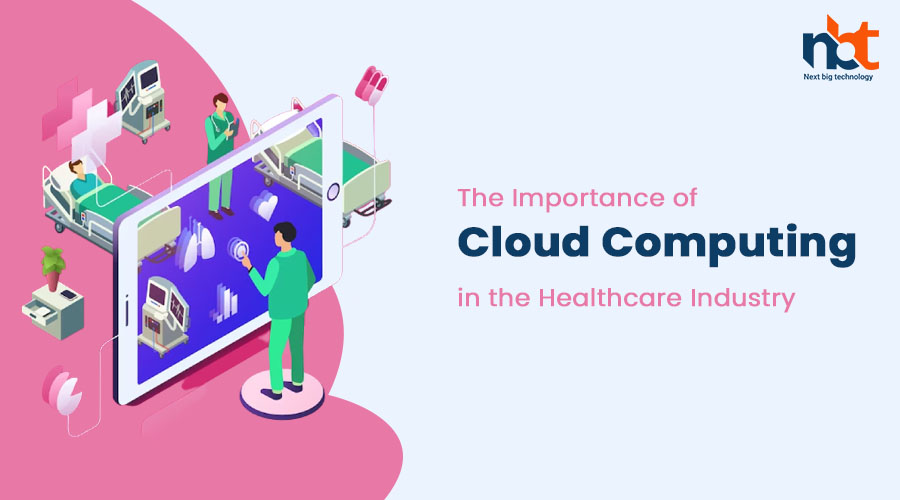Table of Contents
Introduction:
Cloud computing has revolutionized the way businesses operate, and its impact on the healthcare industry has been transformative. Healthcare organizations deal with large volumes of sensitive data, complex systems, and the need for real-time collaboration. Cloud computing offers a secure, scalable, and cost-effective solution for managing healthcare data, improving patient care, and enhancing operational efficiency. In this blog, we will explore the importance of cloud computing in the healthcare industry and how it is reshaping the future of healthcare delivery.
Data Storage and Accessibility:
One of the key advantages of cloud computing in healthcare is its ability to store and access vast amounts of healthcare data securely. Cloud-based storage systems offer virtually unlimited storage capacity, eliminating the need for physical storage infrastructure. Healthcare organizations can securely store electronic health records (EHRs), medical images, lab results, and other critical patient data in the cloud. Cloud storage ensures data redundancy, availability, and accessibility from anywhere at any time, enabling healthcare professionals to access patient information quickly and make informed decisions.
Scalability and Flexibility:
The healthcare industry experiences peaks and troughs in demand for services. Cloud computing allows healthcare organizations to scale their IT infrastructure up or down based on demand. This scalability ensures that healthcare providers have the necessary computing power and resources to handle fluctuating patient loads, especially during emergencies or peak periods. Cloud-based services can be easily provisioned, ensuring that healthcare organizations can quickly adapt to changing needs without significant capital investments or disruptions in service.
Enhanced Collaboration and Communication:
Cloud computing facilitates seamless collaboration and communication among healthcare professionals, regardless of their physical locations. Cloud-based platforms enable real-time sharing of patient data, test results, and medical images, empowering healthcare teams to collaborate more effectively and make well-informed decisions. Cloud-based communication tools, such as secure messaging and video conferencing, enable remote consultations, virtual visits, and telemedicine, enhancing patient care and access to healthcare services.
Data Security and Privacy:
Data security and privacy are paramount in the healthcare industry. Cloud computing provides robust security measures to protect sensitive patient data. Cloud service providers adhere to stringent security standards and compliance regulations, such as HIPAA (Health Insurance Portability and Accountability Act) in the United States. Cloud infrastructure includes advanced encryption, access controls, and regular security updates, ensuring data confidentiality and integrity. Additionally, cloud providers have dedicated teams to monitor and respond to security threats, minimizing the risk of data breaches.
Disaster Recovery and Business Continuity:
Cloud computing offers healthcare organizations robust disaster recovery and business continuity capabilities. Traditional on-premises infrastructure is susceptible to physical damage from natural disasters, hardware failures, or cyberattacks. Cloud-based systems automatically replicate data across multiple geographically distributed data centers, ensuring data redundancy and minimizing the risk of data loss. In the event of a disaster, healthcare organizations can quickly recover their systems and access critical data, ensuring uninterrupted patient care and minimizing downtime.
Cost Efficiency:
The healthcare industry faces budget constraints and increasing pressure to optimize costs without compromising patient care. Cloud computing offers cost-efficient solutions by eliminating the need for significant upfront investments in hardware, software, and maintenance. Healthcare organizations can leverage cloud services on a pay-as-you-go model, scaling resources as needed and only paying for what they use. This approach reduces capital expenses, IT infrastructure costs, and the burden of managing complex systems, enabling healthcare organizations to allocate resources more effectively and focus on patient care.
AI and Machine Learning Applications:
Cloud computing provides a scalable and powerful infrastructure to support advanced technologies like artificial intelligence (AI) and machine learning (ML) in healthcare. Cloud-based AI and ML algorithms can analyze vast amounts of healthcare data to identify patterns, predict disease outcomes, and improve diagnostic accuracy. Cloud platforms allow healthcare organizations to leverage these technologies without the need for significant computational resources, opening up new possibilities for personalized medicine, precision healthcare, and drug discovery.
Telehealth and Remote Patient Monitoring:
Cloud computing has played a crucial role in the rapid adoption of telehealth and remote patient monitoring services. Cloud-based platforms enable secure transmission and storage of patient health data, facilitating remote consultations, virtual visits, and continuous monitoring of patient vital signs. Healthcare providers can remotely monitor patients, track health trends, and intervene proactively, improving patient outcomes and reducing hospital readmissions.
Health Information Exchange:
Interoperability and seamless exchange of health information are essential for coordinated and patient-centric care. Cloud computing enables health information exchange (HIE) by providing a secure and scalable platform to share patient data among healthcare providers, hospitals, laboratories, and other stakeholders. Cloud-based HIE systems ensure that healthcare professionals have access to comprehensive patient information, leading to better care coordination and improved patient outcomes.
Research and Innovation:
Cloud computing facilitates data sharing, collaboration, and data analytics, supporting research and innovation in the healthcare industry. Researchers can leverage cloud platforms to analyze large datasets, perform genome sequencing, and develop predictive models for disease prevention and treatment. Cloud-based infrastructure accelerates the pace of medical research, fosters collaboration among institutions, and drives breakthrough discoveries.
Conclusion:
Cloud computing has become a game-changer in the healthcare industry, revolutionizing the way healthcare organizations store, manage, and utilize data. From data storage and accessibility to enhanced collaboration, security, and cost efficiency, cloud computing offers a myriad of benefits for healthcare providers, patients, and researchers. As the healthcare industry continues to evolve, cloud computing will play an increasingly crucial role in enabling innovation, improving patient care, and driving advancements in healthcare delivery. Embracing cloud technologies will empower healthcare organizations to harness the power of data, enhance operational efficiency, and ultimately transform the way healthcare services are delivered in the future.
Thanks for reading our post “The Importance of Cloud Computing in the Healthcare Industry”. Please connect with us to know more about cloud computing.










